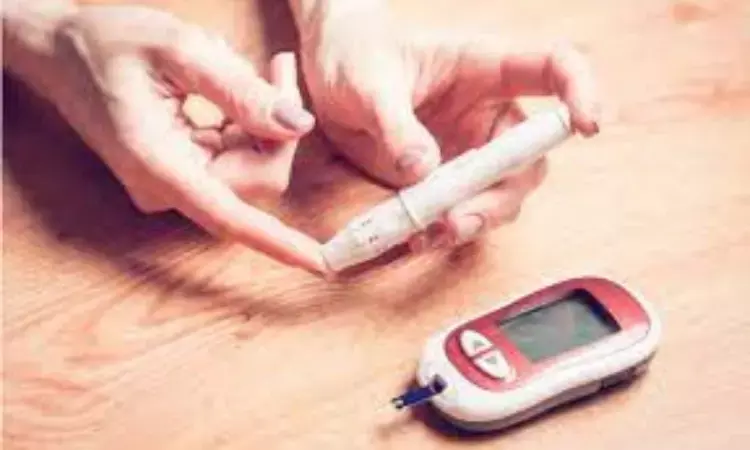- Home
- Medical news & Guidelines
- Anesthesiology
- Cardiology and CTVS
- Critical Care
- Dentistry
- Dermatology
- Diabetes and Endocrinology
- ENT
- Gastroenterology
- Medicine
- Nephrology
- Neurology
- Obstretics-Gynaecology
- Oncology
- Ophthalmology
- Orthopaedics
- Pediatrics-Neonatology
- Psychiatry
- Pulmonology
- Radiology
- Surgery
- Urology
- Laboratory Medicine
- Diet
- Nursing
- Paramedical
- Physiotherapy
- Health news
- Fact Check
- Bone Health Fact Check
- Brain Health Fact Check
- Cancer Related Fact Check
- Child Care Fact Check
- Dental and oral health fact check
- Diabetes and metabolic health fact check
- Diet and Nutrition Fact Check
- Eye and ENT Care Fact Check
- Fitness fact check
- Gut health fact check
- Heart health fact check
- Kidney health fact check
- Medical education fact check
- Men's health fact check
- Respiratory fact check
- Skin and hair care fact check
- Vaccine and Immunization fact check
- Women's health fact check
- AYUSH
- State News
- Andaman and Nicobar Islands
- Andhra Pradesh
- Arunachal Pradesh
- Assam
- Bihar
- Chandigarh
- Chattisgarh
- Dadra and Nagar Haveli
- Daman and Diu
- Delhi
- Goa
- Gujarat
- Haryana
- Himachal Pradesh
- Jammu & Kashmir
- Jharkhand
- Karnataka
- Kerala
- Ladakh
- Lakshadweep
- Madhya Pradesh
- Maharashtra
- Manipur
- Meghalaya
- Mizoram
- Nagaland
- Odisha
- Puducherry
- Punjab
- Rajasthan
- Sikkim
- Tamil Nadu
- Telangana
- Tripura
- Uttar Pradesh
- Uttrakhand
- West Bengal
- Medical Education
- Industry
Hyperglycemia tied to higher risk of subsequent stroke: JAHA

USA: Hyperglycemia on admission is associated with a higher rate of subsequent ischemic stroke following a high-risk transient ischemic attack or minor stroke, findings from a post hoc analysis of the POINT Trial show. The findings, published in the Journal of the American Heart Association (JAHA), provide further support in this high‐risk patient population, for developing secondary prevention strategies.
Further, the study found that a rapid, simple assay of serum glucose may be a useful biomarker for identifying patients at particularly high risk of subsequent ischemic stroke.
Every ischemic stroke is an opportunity to prevent another, potentially more severe, stroke. Also, one‐quarter of all strokes are shown to be subsequent events. Against this backdrop, Brian Mac Grory, Department of Neurology, Duke University School of Medicine, Durham, NC, and colleagues aimed to determine whether serum glucose measured on presentation to the emergency department is associated with the risk of subsequent ischemic stroke within 90 days after a high‐risk TIA or minor ischemic stroke. Also, they hypothesized that elevated admission serum glucose is related to a higher risk of subsequent stroke.
For this purpose, the researchers performed a secondary analysis of the POINT (Platelet Oriented Inhibition in New TIA and Minor Ischemic Stroke) trial and evaluated the relationship between serum glucose hyperglycemia (≥180 mg/dL) versus normoglycemia (<180 mg/dL) before enrollment in the trial and outcomes at 90 days.
The primary endpoint was subsequent ischemic stroke with adjustment for age, sex, race, ethnicity, study treatment assignment, index event, and key comorbidities.
Salient findings of the study include:
- Of 4878 patients included in this study, 267 had a recurrent stroke. There was a higher hazard of subsequent stroke in patients with hyperglycemia compared with normoglycemia (adjusted hazard ratio [HR], 1.50).
- Treatment with dual antiplatelet therapy was not associated with a reduced hazard of subsequent stroke in patients with hyperglycemia (HR, 1.18), though the wide confidence interval does not exclude a treatment effect.
- When modeled as a continuous variable, there was evidence of a nonlinear association between serum glucose and the hazard of subsequent stroke.
Based on the findings, the authors concluded that patients with hyperglycemia had a higher risk of subsequent ischemic stroke than patients with normoglycemia within the POINT clinical trial.
Reference:
The study titled, "Hyperglycemia, Risk of Subsequent Stroke, and Efficacy of Dual Antiplatelet Therapy: A Post Hoc Analysis of the POINT Trial," was published in the Journal of the American Heart Association.
Dr Kamal Kant Kohli-MBBS, DTCD- a chest specialist with more than 30 years of practice and a flair for writing clinical articles, Dr Kamal Kant Kohli joined Medical Dialogues as a Chief Editor of Medical News. Besides writing articles, as an editor, he proofreads and verifies all the medical content published on Medical Dialogues including those coming from journals, studies,medical conferences,guidelines etc. Email: drkohli@medicaldialogues.in. Contact no. 011-43720751


